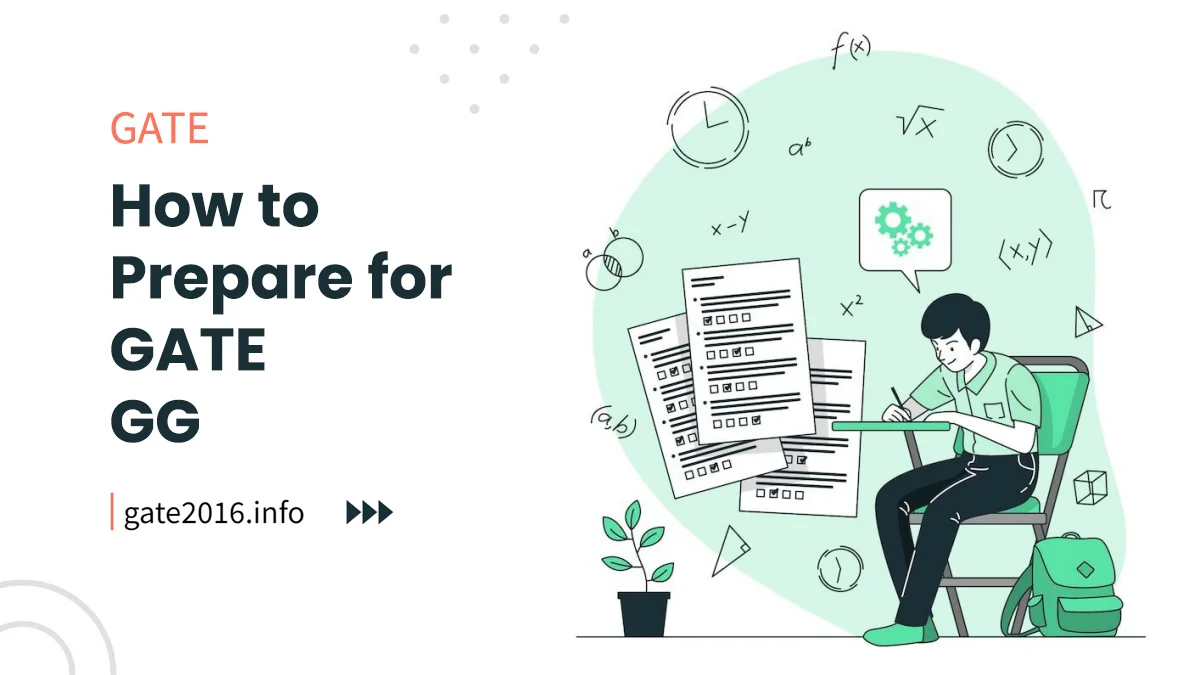Advertisements
Ratings

GATE 2024 GG Preparation – The Graduate Aptitude Test in Engineering (GATE) plays a pivotal role for individuals aspiring to specialize in Geology and Geophysics.
This multidisciplinary field encompasses the study of Earth’s processes, rock formations, and the interpretation of subsurface structures.
Effective preparation is the cornerstone of excelling in the GATE Geology and Geophysics exam.
This comprehensive guide provides strategies, tips, and a step-by-step approach to help you prepare thoroughly and achieve success in the exam.
Contents
- 1. Introduction to GATE Geology and Geophysics
- 2. Understanding the GATE Geology and Geophysics Syllabus
- 3. Developing a Structured Study Plan
- 4. Selection of Relevant Study Materials
- 5. Mastering Core Concepts
- 6. Solving Practical Problems
- 7. Reviewing Previous Years’ Question Papers
- 8. Taking Mock Tests
- 9. Time Management Strategies
- 10. Implementing Revision Techniques
- 11. Staying Informed with Industry Trends
- 12. Managing Exam Stress
- 13. Final Weeks’ Preparation Strategy
- 14. Approaching Exam Day Confidently
- 15. Reflecting on the Exam and Planning Ahead
- Conclusion: Excelling in GATE Geology and Geophysics
- Additional Resources and References
- GATE Geology and Geophysics Guidance
- GATE Geology and Geophysics Preparation FAQs
- GATE Total Information & Guidance
1. Introduction to GATE Geology and Geophysics
GATE provides a platform for candidates interested in Geology and Geophysics to showcase their expertise and knowledge in these fields.
Adequate preparation not only ensures success in the GATE Geology and Geophysics exam but also paves the way for contributing to the understanding of Earth’s dynamic processes.
2. Understanding the GATE Geology and Geophysics Syllabus
A profound understanding of the GATE Geology and Geophysics syllabus is fundamental for effective preparation.
Let’s delve into the syllabus by breaking it down into subjects and key topics:
Table 1: GATE Geology and Geophysics Syllabus Breakdown
| Subject | Key Topics |
|---|---|
| Geology | Mineralogy, Petrology, Structural Geology |
| Sedimentology | Sedimentary rocks, Depositional environments |
| Paleontology | Fossils, Evolutionary trends |
| Stratigraphy | Principles, Correlation, Geologic time scale |
| Mineral Exploration | Ore deposits, Exploration techniques |
| Geophysics | Seismic methods, Gravity and magnetic methods |
| Remote Sensing | Satellite imagery interpretation, Remote sensing techniques |
| Environmental Geology | Natural hazards, Environmental impact assessment |
3. Developing a Structured Study Plan
Creating a well-structured study plan is the bedrock of effective GATE Geology and Geophysics preparation.
Organize your study plan by dedicating time to various subjects and topics based on their significance and complexity.
Table 2: Sample Study Plan
| Week | Subjects/Topics | Time Allocation |
|---|---|---|
| 1-2 | Geology | 12 hours/week |
| 3-4 | Sedimentology | 10 hours/week |
| 5-6 | Paleontology | 10 hours/week |
| 7-8 | Stratigraphy | 12 hours/week |
| 9-10 | Mineral Exploration | 10 hours/week |
| 11-12 | Geophysics | 12 hours/week |
| 13-14 | Remote Sensing | 8 hours/week |
| 15-16 | Environmental Geology | 8 hours/week |
4. Selection of Relevant Study Materials
Choosing the right study materials is paramount for comprehensive GATE Geology and Geophysics preparation.
Utilize a combination of textbooks, online courses, video lectures, and practice tests for a well-rounded approach.
Table 3: Recommended Study Resources
| Subject | Books | Online Resources |
|---|---|---|
| Geology | “Introduction to Mineralogy” by William D. Nesse | Coursera’s Geology courses |
| Sedimentology | “Principles of Sedimentology and Stratigraphy” by Sam Boggs Jr. | USGS’s Sedimentology resources |
| Paleontology | “Invertebrate Paleontology” by Robert L. Kaesler | Paleontological Society’s resources |
| Stratigraphy | “Principles of Sequence Stratigraphy” by Octavian Catuneanu | AAPG’s Sequence Stratigraphy resources |
| Mineral Exploration | “Introduction to Mineral Exploration” by Charles J. Moon | Society of Economic Geologists’ resources |
| Geophysics | “Fundamentals of Geophysics” by William Lowrie | IRIS’s Geophysics courses |
| Remote Sensing | “Remote Sensing and Image Interpretation” by Thomas Lillesand | ESA’s Remote Sensing tutorials |
| Environmental Geology | “Environmental Geology” by Carla W. Montgomery | USGS’s Environmental Geology resources |
5. Mastering Core Concepts
Establishing a strong foundation in core Geology and Geophysics concepts is crucial.
Concentrate on fundamental principles within each subject:
Table 4: Mastering Core Concepts
| Subject | Key Concepts |
|---|---|
| Geology | Mineral identification, Igneous rock classification, Geological maps |
| Sedimentology | Sedimentary processes, Grain size analysis, Sedimentary structures |
| Paleontology | Fossil identification, Evolutionary patterns, Stratigraphic uses |
| Stratigraphy | Lithostratigraphy, Biostratigraphy, Chronostratigraphy |
| Mineral Exploration | Ore deposit types, Exploration techniques, Resource estimation |
| Geophysics | Seismic wave propagation, Gravity anomalies, Magnetic anomalies |
| Remote Sensing | Image interpretation, Spectral signatures, Vegetation indices |
| Environmental Geology | Natural hazard assessment, Groundwater contamination, Environmental impact |
6. Solving Practical Problems
Balancing theoretical knowledge with practical problem-solving skills is essential. Practice problems related to:
- Geology: Identifying minerals, interpreting geological maps.
- Geophysics: Analyzing seismic data, interpreting gravity and magnetic anomalies.
- Sedimentology: Determining sedimentary environments, analyzing sedimentary structures.
7. Reviewing Previous Years’ Question Papers
Solving previous years’ question papers offers insights into question patterns, difficulty levels, and exam trends:
Table 5: Benefits of Solving Previous Years’ Papers
| Benefit | Description |
|---|---|
| Identify Question Patterns | Recognize common question formats and trends |
| Enhance Time Management | Practice completing the paper within time |
| Understand Exam Difficulty | Evaluate question difficulty distribution |
| Self-Assessment | Measure your preparation level and progress |
8. Taking Mock Tests
Taking mock tests under simulated exam conditions is vital for building confidence and refining time management:
Table 6: Benefits of Taking Mock Tests
| Benefit | Description |
|---|---|
| Simulate Exam Environment | Replicate actual exam conditions |
| Improve Time Management | Enhance time allocation skills |
| Boost Confidence | Increase confidence before the real exam |
| Identify Weak Areas | Identify topics needing further attention |
9. Time Management Strategies
Effective time management during the exam is pivotal. Develop a strategy to allocate time to different sections:
Table 7: Time Management Strategy
| Section | Recommended Time Allocation |
|---|---|
| General Aptitude | 15 minutes |
| Subject Sections | 75 minutes each |
10. Implementing Revision Techniques
Regular revision is essential for retaining information. Utilize structured techniques to reinforce your understanding:
- Revision Schedule: Allocate time for revisiting key topics regularly.
- Concise Notes: Create summarized notes and concept maps for quick review.
11. Staying Informed with Industry Trends
Staying current with the latest technological trends in Geology and Geophysics is vital:
- Follow Industry News: Subscribe to reputable geological and geophysical news sources.
- Participate in Webinars: Attend webinars and workshops to learn about emerging technologies.
12. Managing Exam Stress
Effective stress management is crucial for maintaining focus during preparation:
- Relaxation Techniques: Practice mindfulness, meditation, and deep breathing.
- Balanced Routine: Incorporate relaxation, exercise, and mindfulness into your study routine.
13. Final Weeks’ Preparation Strategy
As the exam date approaches, intensify revision of key subjects and challenging topics:
- Focused Revision: Allocate more time to challenging subjects.
- Additional Mock Tests: Simulate exam conditions with extra practice tests.
14. Approaching Exam Day Confidently
On the exam day, stay composed:
- Read Instructions Carefully: Understand question patterns and instructions.
- Effective Time Allocation: Allocate time wisely to different sections.
15. Reflecting on the Exam and Planning Ahead
Evaluate your performance and plan your next steps:
- Performance Analysis: Identify strengths and areas for improvement.
- Future Planning: Decide whether to pursue advanced studies or enter the geosciences industry.
Conclusion: Excelling in GATE Geology and Geophysics
Preparing for GATE Geology and Geophysics demands dedication, meticulous planning, and a focused approach.
By following this comprehensive guide, aspiring candidates can significantly enhance their chances of excelling in the examination and contributing to the fields of geology, geophysics, and Earth sciences.
Additional Resources and References
For additional resources and references, explore the recommended textbooks, online courses, geological societies, and practice papers mentioned in this guide.
These resources will further enrich your understanding and preparation for the GATE Geology and Geophysics exam.
GATE Geology and Geophysics Guidance
- How to Prepare for GATE Geology and Geophysics: A Comprehensive Guide
- GATE 2025 Books: Geology & Geophysics
- GATE GG Syllabus 2025: Geology & Geophysics
- GATE GG Previous Year Solved Papers – (2023-2007)
GATE Geology and Geophysics Preparation FAQs
What is GATE Geology and Geophysics (GG)?
GATE GG is an examination conducted by the Indian Institute of Technology (IIT) for admission into postgraduate programs in Geology and Geophysics and related fields.
It assesses candidates' knowledge and understanding of geological and geophysical concepts and serves as a gateway to higher education and career opportunities in these fields.
What are the important subjects to focus on for GATE Geology and Geophysics preparation?
Key subjects to focus on include geology, mineralogy, petrology, structural geology, sedimentology, stratigraphy, geophysics, and earth sciences.
The GATE syllabus for Geology and Geophysics covers various aspects of earth sciences.
How should I prepare for the GATE GG exam?
Effective preparation involves creating a study plan based on the GATE syllabus. Use standard textbooks, reference materials, and online resources for each subject.
Practice solving previous years' question papers and mock tests to become familiar with the exam pattern and improve your problem-solving skills.
Are there any recommended books or resources for GATE Geology and Geophysics preparation?
Yes, some recommended books and resources include:
- 'Principles of Sedimentology and Stratigraphy' by Sam Boggs Jr.
- 'Introduction to Mineralogy' by William D. Nesse
- 'Structural Geology' by Haakon Fossen
- 'Geophysics: Principles and Concepts' by Michael A. Pelissier
- Online courses and lecture videos from reputable institutions and platforms like Coursera and edX.
What is the exam pattern for GATE Geology and Geophysics, and how should I approach it?
GATE GG typically consists of multiple-choice questions, multiple-select questions, and numerical answer type questions.
Questions cover various aspects of geology, geophysics, and earth sciences. Start by answering questions you are confident about and manage your time efficiently.
For numerical answer type questions, ensure precision in your answers. A strong understanding of geological and geophysical concepts and their applications is essential for success in the exam.
Recent Posts
- AAI Through GATE 2024 – JE (Junior Executive)
- M Tech and MS Programs Through GATE and GRE: Navigating Postgraduate Options
- Job Opportunities After GATE 2024 in India: What You Didn’t Know!
- BSPHCL Through GATE 2024 – 40 AEE
Related Tags
How to prepare for gate geology and geophysics pdf 2024, How to prepare for gate geology and geophysics in india 2024, How to prepare for gate geology and geophysics quora 2024, gate geology rank for ongc 2024, gate geology coaching 2024, gate geology subject wise weightage 2024, gate geophysics coaching 2024, gate geology? – quora 2024
| GATE (Reasoning & Aptitude & Maths) Books |
| GATE Guide Books |
GATE Total Information & Guidance
Click below given links to get further information.






